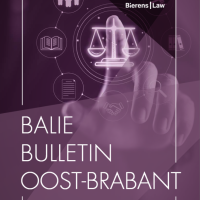Principle of Proportionality ('evenredigheidsbeginsel')
Following the childcare benefits scandal, there has been a societal call for the government to apply a more human-centered approach. Currently, a trend can be observed in which the principle of proportionality is gaining ground within administrative law, which also includes tax law.
Expansion
The principle of proportionality is codified in Article 3:4, paragraph 2 of the General Administrative Law Act (Awb). This article stipulates that the adverse consequences of a decision must not be disproportionate in relation to the objectives the decision serves. At present, this article only applies to decisions based on discretionary powers (i.e., "may" provisions in legislation and regulations).
However, the principle of proportionality is evolving. Case law reveals a trend toward broader application of this principle. For instance, the Council of State and the Trade and Industry Appeals Tribunal (CBB) have issued rulings applying the principle of proportionality in ways favorable to citizens (Council of State, February 2, 2022, ECLI:NL:RVS:2022:285; Council of State, March 1, 2023, ECLI:NL:RVS:2023:772; and CBB, March 26, 2024, ECLI:NL:CBB:2024:190). These rulings demonstrate that it is also possible to review decisions based on formal statutory law, where mandatory powers are involved, against the principle of proportionality (Supreme Court, October 6, 2023, ECLI:NL:HR:2023:1371).
There are now also legislative proposals to expand the principle of proportionality as formulated in Article 3:4, paragraph 2 Awb, to allow for the review of mandatory powers contained in formal legislation against the principle of proportionality (proposed law: "Strengthening Safeguard Function Awb").
Tax Interest
The principle of proportionality is also receiving attention within tax law. A successful appeal to this principle was made in a case regarding tax interest. In recent years, the tax interest in corporate income tax matters has increased significantly. As of 2022, the rate was raised to 8%, and by 2024 it increased further to 10%. This increase has had implications for tax advisory and accountancy firms, particularly regarding professional liability. For instance, if a provisional assessment is not timely requested for a client, the resulting tax interest under the current rate can quickly accumulate, often leading to claims reported to professional liability insurers.
In the case leading to the judgment by the Northern Netherlands District Court on November 7, 2024, an appeal was made to the principle of proportionality concerning the 8% interest rate. The court found the rate to be disproportionate (ECLI:NL:RBNNE:2024:4361) and lowered it to 4%.
Review
Appealing to the principle of proportionality is not straightforward. It requires distinguishing between mandatory and discretionary powers. For mandatory powers, it is crucial to determine whether they arise from the law or from generally binding regulations. This distinction determines how the principle of proportionality can be assessed and how an appeal should be structured.
Possible Applications
The principle of proportionality may be valuable, for example, in situations where the Tax Authorities request information from a taxpayer, as this concerns a discretionary power.
Additionally, tax law includes many implementation decrees and regulations. Recent case law offers guidance on how these fiscal regulations can be reviewed under the principle of proportionality.
Conclusion
So far, there have been few cases in tax law where an appeal to the principle of proportionality has been successful. However, the (scarce) rulings where it has succeeded are striking and practically relevant. And who knows what the future may hold. In any case, it is a positive development that the principle of proportionality appears to be taking on a more significant role within administrative and tax law. This encourages the fair and humane application of (fiscal) laws and regulations.
(* This contribution incorporates developments up to and including January 2025.)

